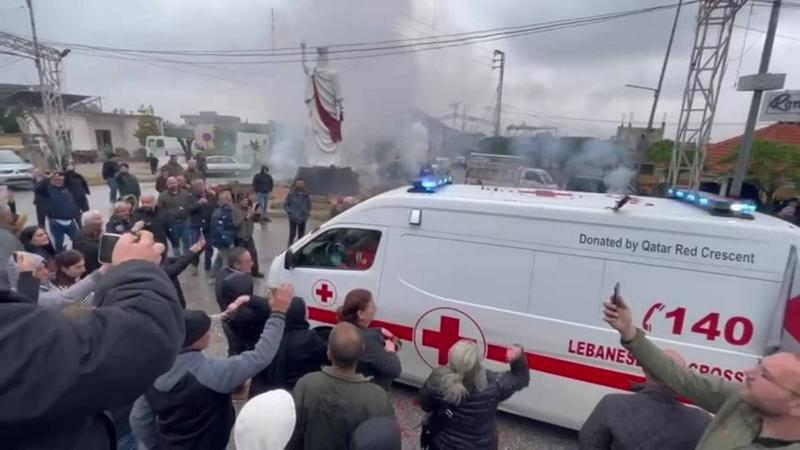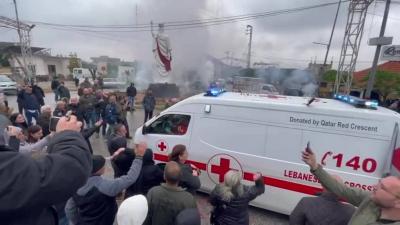The coordinator of the "Lebanese Forces" in the Jbeil area, Pascal Suleiman, will be laid to rest on Friday in a public funeral. Maronite Patriarch Beshara Al-Rahi will preside over the burial ceremony at St. George Church in the city of Jbeil at 1 PM. Lebanese authorities have arrested seven Syrians suspected of being involved in Suleiman's murder. A military source indicated that Syrian authorities handed over three of the suspects to Lebanese intelligence. A judicial source told AFP that "the detainees' testimonies unanimously indicated that the sole motive for the crime was the theft of Suleiman's car."
On its part, the Syrian Observatory for Human Rights confirmed that Suleiman's body was found in the Qusayr area of the Homs province. This border area is under the control of Syrian regime forces and is influenced by Hezbollah.
In parallel to these events, well-informed sources revealed to "Nidaa al-Watan" that Lebanon nearly fell into a Christian-Syrian conflict due to the reactions following Suleiman's kidnapping and murder. According to the data from these sources, the quick announcement that the four members of the gang who executed the crime were Syrian nationals ignited emotions among Christian communities, seemingly preparing for reactions against Syrian refugees. Were these developments connected to broader factors? Sources suggest that there are indications that the planning behind Suleiman's kidnapping and murder aimed to mix the cards and divert attention from the developments surrounding the war in Gaza, and consequently the ongoing conflict on the southern borders.
Moreover, these sources revealed that a high-ranking official recently received diplomatic warnings from Lebanon that the situation is on the brink of expanding the conflict, which would cost Lebanon dearly, not just the south. They stated, "There is no doubt that refugees are a ticking time bomb in Lebanon, among them organized terrorist groups, which security agencies and the army are addressing. However, it is clear there is an attempt to drag Lebanon into a war similar to the Palestinian one, to shift the confrontation to the interior under the banner of 'Christians against refugees.'"
Yesterday, a surprising move was noted from the head of the "Free Patriotic Movement," MP Gebran Bassil, who played on the tensions against Syrian refugees, stating: "No one should try to fish in the divide between us and Hezbollah regarding the linking of fronts." Meanwhile, an attention-grabbing statement came from the Minister of Displaced Persons in the caretaker government, Issam Sharafeddine, who said that "there are 20,000 armed individuals in the camps 'waiting for the zero hour.'" In response to Sharafeddine's comments regarding armed individuals in the camps, Interior and Municipalities Minister Bassam Mawlawi said, "I do not know if they were counted, and all information regarding the camps is with the security forces."
Additionally, Mawlawi confirmed in a press conference following an extraordinary meeting of the Central Security Council in Beirut yesterday that "security forces must strictly enforce Lebanese laws on Syrian refugees." He added, "There must be a clear reduction of the Syrian presence in Lebanon."
For its part, Bkerke continued to monitor the developments of Suleiman's assassination, holding high-level security meetings. Patriarch Al-Rahi met with army commander General Joseph Aoun, Director General of Internal Security Forces Imad Osman, and Director General of General Security Major General Elias Beitroudi. According to information, the army commander briefed the patriarch on everything that transpired, the details of the kidnapping operation, and the latest investigation results. The patriarch was firm in his insistence on the importance of knowing the complete truth in order to calm the atmosphere and extinguish the flames of sectarian strife.
Likewise, Osman and Beitroudi briefed the patriarch on the progress of the investigations and the motives behind the crime. Church sources revealed to "Nidaa al-Watan" that Al-Rahi listened to all the security narratives from all agencies, with his demand being singular: to know the truth without any distortion or concealment. Al-Rahi called on the leaders of the agencies for convincing truth to absorb popular anger. Calls multiplied to escalate security measures, especially in sensitive areas, and to ensure the protection of people after Suleiman's murder, while emphasizing the need to prevent sectarian tensions and to uncover the facts.




